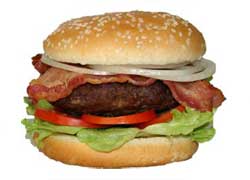Currency experts at The Economist magazine have cooked up a way of checking out if a currency is under or over valued by comparing the worldwide price of Big Mac burgers.
Burgernomics is a light-hearted look at foreign exchange and currency, but provides some insights in to the relationships between currencies.
The idea is to look at purchasing power parity (PPP) as the theory suggests that in the long term exchange rates should float up or down to match the price of a basket of goods and services across different countries.
The Economist basket only contains a Big Mac – but as McDonald’s has 33,000 stores in 119 countries selling a product that is pretty much the same in each store, comparing the price worldwide is quite easy.
The benchmark value is the price of the burger in the USA – an average $4.20.
According to calculations by The Economist, the most expensive Big Mac is sold in Switzerland costing $6.81 – overvaluing the Swiss Franc against the dollar by 62%.
“The exchange rate that would equalise the price of a Swiss Big Mac with an American one is SFr1.55 to the dollar; the actual exchange rate is only 0.96,” says the magazine.
The Big Mac does not sell in India, where the chicken equivalent Maharaja Mac is $1.62 – making the rupee 60% undervalued.
The euro has weakened against the dollar. In July 2011, burgernomics showed the euro was 21% overvalued against the dollar. Now, the gap is less than 5% and still sliding.
In Britain, a Big Mac averages $3.82, which undervalues Sterling by around 9%.
China comes in at $2.44- a massive 40% currency under valuation. The price is right for Japan and the yen – with a Big Mac costing $4.16 against $4.20 in the US.
